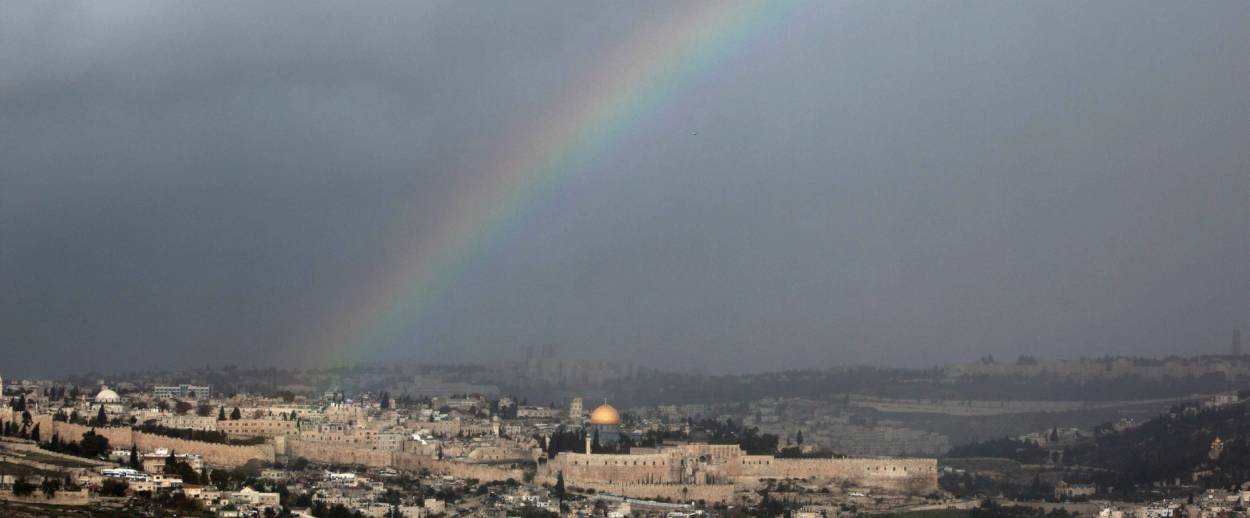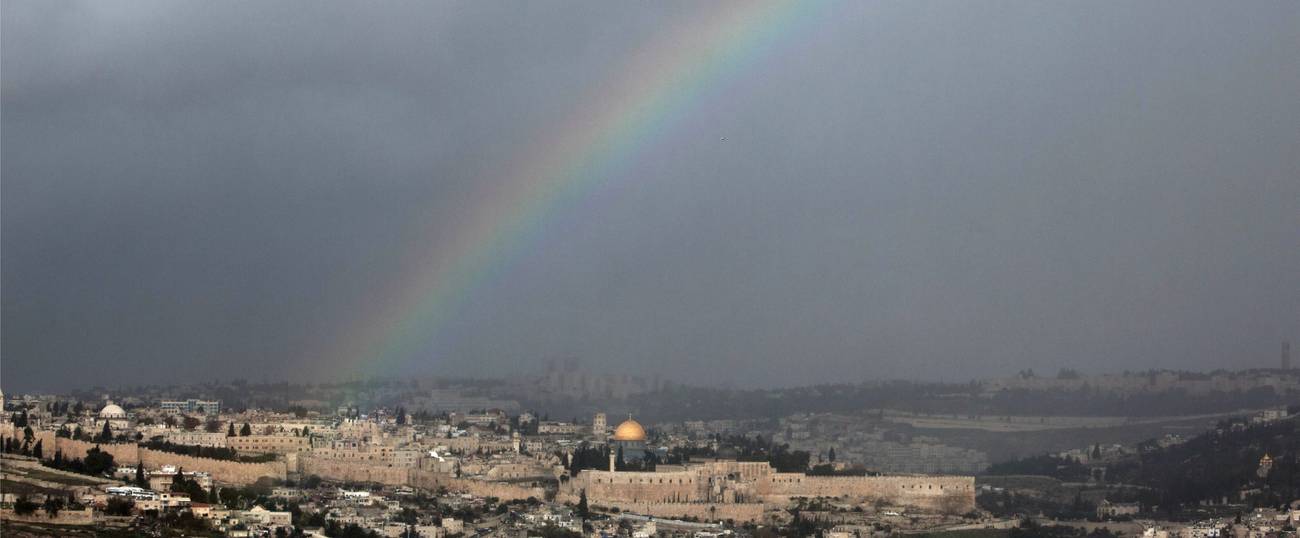Let the Light In
A challenging and nostalgic visit to see my son in Jerusalem became an inspiration




I traveled to Israel for the first time in the late 1970s, when I was 11 years old. I was so amazed by the magnificent topography and the biblical sites we encountered that I decided to photograph my feet at each stop. It was a gathering of evidence to prove I hadn’t dreamt being there that summer, that I had actually borne witness to the country’s splendor.
The magic I experienced still grips me, yet my emotions were conflicted before my trip there last month, my most recent in a decade. I longed to be in Israel and to feel its beating pulse, even as the recent escalation of violence is draping itself over everything, like a film of dust covering the good furniture in the attic. I was particularly anxious to see my son who is learning in a Yeshiva outside Jerusalem.
Not long before my departure in mid-November, I came across the olive wood camel I bought in Jerusalem’s Arab shuk during my inaugural journey. One slim leg had broken off, and I tried unsuccessfully to mend it. Seized by a sudden, outsized attachment to it, I resolved to buy another for nostalgia’s sake, even though I knew it could never replace the original, a relic from a long-gone era in which I could venture into that part of the Old City.
I landed at Ben Gurion at the tail end of a rain shower, gliding through a backlit sky that seemed to say the gates of heaven were open for conversation. Looking up, I began making deals, as if I could pick a combination of lucky numbers to tip the odds in safety’s favor. I projected all of my concerns onto the details of my itinerary: travel by taxi, not public transportation; visit this place alone, but that one only with a companion; restaurants are fine if I sit indoors.
I had traveled by myself, mostly to look my son in the eye and tell him how proud his father and I are of him for being there, especially now. This is his first time in Israel, and he had just settled in when the current semester of violence began, giving him few opportunities to roam the country without the haze of crisis obscuring his view. And I, like other mothers with children there for a gap year, had hardly recovered from his leaving the nest when I settled into a new routine of sleeping with one ear open, imagining the worst, and thanking God each time his yeshiva notified the boys of a lockdown that would keep them from venturing off campus.
But I reasoned with myself that he is old enough to study abroad, and that he has reached the point in his life where I will not always know where he is. What’s more, I thought to myself, if we had raised him in Israel, he would already be a soldier in the army, bringing with it an entire other level of worry. I resolved to hold both my tongue and my breath, to put my faith in his instincts and sense of caution, to pray, and to let him negotiate his own deals with God. It scared me to my core, but I realized this was the only way I could give him the air he needed to grow and the berth to discover Israel’s magic on his own.
While he was busy studying, I set out to reclaim that aura of wonder for myself, pulling it out from behind the screen of news, tragedy, and sadness. I made plans, then consulted Israeli friends who play these odds daily, seeking their advice with some embarrassment since I was merely a guest for the week. Some told me to go everywhere because there are no guarantees anywhere, and that it all comes down to fate and mazal. Others suggested a more cautious approach, like keeping away from outdoor shopping areas and sticking to indoor museums instead. In the end, I struck a balance: proceed, while looking over my shoulder.
I did not get to my favorite Machane Yehuda market in Jerusalem because of an attack there on the morning of my intended visit. And one time, when I let my guard down to linger in front of a shop, a young man inadvertently elbowed me in the back as he raced past, causing me to jump out of my skin. But after taking one city bus for its efficiency, the second and third runs—and later, rides on the light rail—came easily to me. I ate lunch outdoors, twice alone, and roamed Tel Aviv unaccompanied until I reached Bialik’s house.
Meanwhile, it was another week of too many devastating losses. When I saw my son on the day Ezra Schwartz was brutally murdered, I could hardly let him go. The tragedy struck boys and girls studying in Israel for the year especially hard—he’d been their friend, or the friend of a friend—and they were painfully aware that it could have easily been one of them. Yet staring at the heart-wrenching chasm Ezra’s death left behind, most acutely for his family, they also became powerfully sensitized to the fact that each and every loss should feel this personal. I proceeded to feed my son as a way to express my anxiety and sadness without so many words and was able to say goodbye only because I could see that he was thriving. But it was only after I’d already returned home that I found the courage to let him be, on the night he called to say he was joining his peers from across the country for a memorial service at Ezra’s yeshiva, and, later that same evening, a wedding to which an entire nation had been invited. Acts of faith and love on the heels of mourning, but also defiance against those would have us stop in our tracks.
The weather during my stay was glorious, allowing me to cover a lot of terrain in a short span. To witness the azure sky and the crashing waves and the lush olive trees meant they were not mere memories from earlier days, and in that way they, too, signified faith, love, and defiance. It is no small miracle they are still there, burning yet not consumed.
I tried, but could not find an authentic replacement camel anywhere, only a plastic one from China atop a shelf in a gift shop that left me longing for another time. I did, however, take pictures of my feet wading in the Mediterranean for old time’s sake. One day, I traveled up north with a friend. Through the car window, I watched cacti bursting with sabra fruit and date palms swaying in the gentle breeze. We stopped to take in the breathtaking views from the mountain tops and to declare the glory of the land and the wonder that is Israel’s oxygen. In the background, the news continued its painful barrage from the car radio, more staccato than thrum, though for a few fleeting moments, as we gazed out onto the horizon, it was possible to forget the darkness and see only the light.
Merri Ukraincik is a blogger and essayist who is at work on a memoir. Follow her at merriukraincik.com.